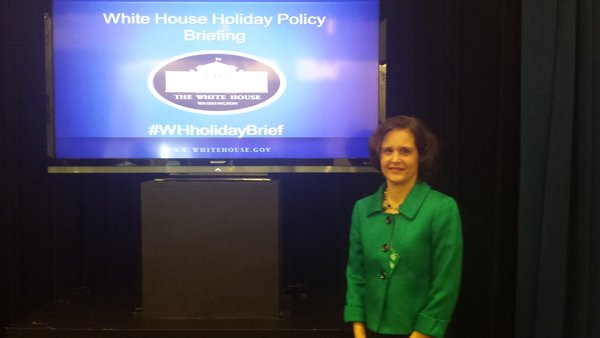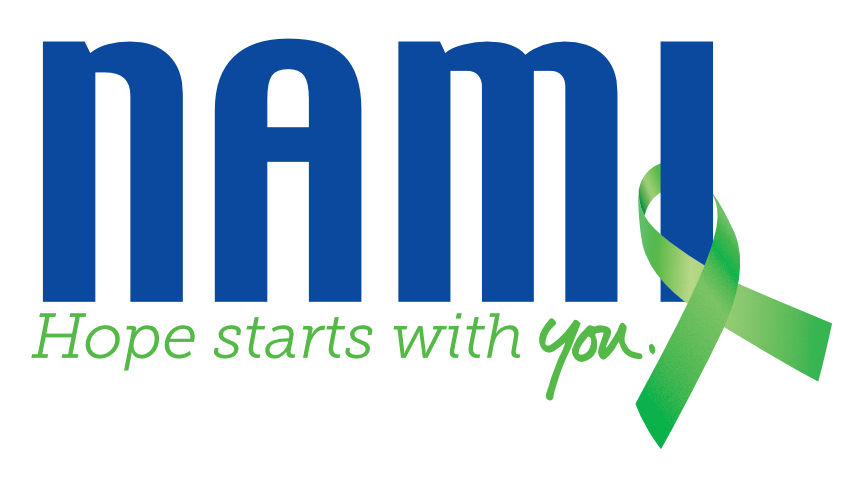
NAMI CEO Mary Giliberti at White House forum about mental illness
(1-20-17) NAMI’s CEO Mary Giliberti and the board have responded to a letter and petition drive launched on the Internet by some well-known NAMI members and activists who are angry because they believe NAMI is not paying sufficient attention to the seriously mentally ill. Full disclosure: I am a NAMI member.)
NAMI’s Response to criticism
January 18, 2017
Dear Ms. Pasquini, Ms. Burns, Ms. Nanos, Ms. Pogliano, Ms. Hays, Mr. Jaffe, Ms. Hoff, Mr. Hernandez, and and co-signers:
Thank you very much for your letter and for the accompanying stories of individuals and families who were unable to get help needed in a timely way. I take calls on a weekly basis on the NAMI Helpline when I am in Arlington, and I’m sad to say that I have personally spoken with many individuals and families who are enduring similar frustrations and heartbreak. I am very appreciative of your participation in NAMI and its mission of bringing help and hope to those who are facing the results of a failed mental health system.
We share your gratitude about the enactment of HR 2646, the Helping Families in Mental Health Crisis Act. During the three years it took to achieve final passage, NAMI worked hard and generated hundreds of thousands of petitions, emails, tweets, calls, and letters to members of Congress to make sure the voices of the mental health community were heard.
We were told personally by Hill staffers that the overwhelming numbers of communications from the grassroots had a significant impact on keeping the bill alive and moving it through the lengthy process. Additionally, our staff spent many hours behind the scenes communicating with our state and local affiliates and members, many of whom were receiving misleading information from opponents of the bill.
We agree that ensuring the promises of HR 2646 translate into actual improvements in mental health care is only just beginning.
The new authorities established in the bill, such as a new grant program for Assertive Community Treatment (ACT) and a new grant program to improve crises responses, will require specific funding, as will continuation of the Assisted Outpatient Treatment (AOT) demonstration grants. The new positions established in the legislation, such as the Assistant Secretary for Mental Health and Substance Use Disorders and the Medical Director, must be filled with the right people. And, the administrative and policy provisions to direct funding for services for people most in need will require work with the federal agencies responsible for implementation and extensive grassroots education.
Much of the work we do is focused on issues that affect people with the most significant mental illnesses and their families. For example, to name just a few:
- We receive 50,000 calls per year on the NAMI Helpline and by far the most common received calls concern individuals with schizophrenia and bipolar disorder, many of whom are involved with criminal justice systems;
- We work extensively with law enforcement communities and our grassroots on Crisis Intervention Team (CIT) implementation and other strategies to facilitate mental health care in lieu of unnecessary incarceration;
- We are prioritizing expansion of First Episode Psychosis (FEP) programs, a true sea change in the way mental health services and supports are provided to young people who first experience symptoms of psychosis, with potential to break the trajectory of suffering that so often results because of long delays in the time between first emergence of symptoms and the provision of treatment and supportive services. Early research on first episode psychosis, including the NIMH Recovery After an Initial Schizophrenia Episode (RAISE) program, shows very promising results both in reducing symptoms and in enabling those who receive these services to remain in school or work. The expansion of FEP programs throughout the country is in no small part attributable to NAMI’s efforts. When we started our advocacy for these programs, there were fewer than a dozen. Today, there are more than 100 such programs and they continue to increase throughout the country.
- We advocate strenuously every year for adequate federal funding for housing, including Section 811, Section 8, and permanent supportive housing under the McKinney-Vento Homeless Assistance Program.
- We work extensively with the Centers for Medicare and Medicaid Services (CMS), and with various coalitions, to protect and expand services for people with serious mental illness in Medicaid. As you know, our work on Medicaid has included advocating for repeal of the Institutions for Mental Diseases (IMD) exclusion. While some progress has been made on this, full repeal has proven elusive to date largely due to cost concerns.
Here at NAMI, we not only work on issues affecting persons who are most ill, but also think carefully about how we approach our work based on feedback from those who are part of our NAMI community. For example, much of your letter highlights Assisted Outpatient Treatment (AOT). As you know, NAMI supports AOT as a last resort and we communicate this to policy makers and the media. In fact, we talk to families every day and know that they agonize about whether or not to seek AOT orders because of the feared ramification on their relationship with their loved one.When they do move forward, they often are not supported and find it difficult to navigate the legal system. They worry about what will happen when the court order expires.
The biggest challenge we face is how to help people engage in treatment and services over the long-term so they can meet their life goals for relationships, stable homes, work or volunteer opportunities. There are many reasons why people do not engage, including the severity of their symptoms so they do not believe they need help in some cases, but the fact is that we have yet to come up with a system that is geared toward helping people engage, and remain engaged, in services that can not only be lifesaving, but can foster long term recovery as well.
That is why we are very interested in systems that are being set up in San Francisco, Contra- Costa County and other parts of California that combine AOT with peer and family supports and seek to involve individuals as much as possible in their own treatment planning. These are systems that, in theory at least, combine AOT with strong recovery oriented models and conduct extensive outreach so AOT is used as a last resort and families and individuals are supported through the process. It remains to be seen whether they will be successful in fostering long term engagement, but they are worth studying and supporting. We know that your work had much to do with getting these programs established.
We were pleased that HR 2646 extended the federal AOT demonstration program through 2022. We supported full appropriations for this program in Fiscal Year 2016 and will continue to support and advocate for full funding. This program presents an excellent opportunity to assess differing approaches to determine what works best and under what circumstances. NAMI will also continue to explore other programs and practices that support engagement and helping people realize their potential.
While we were thrilled that HR 2646 was signed into law, we were disappointed that the final bill did not fully address the barriers that caregivers face in getting basic information about their loved ones.
NAMI recommended that the guidance issued by the HHS Office of Civil Rights on communications with families and caregivers under HIPAA should be codified into law. This approach was ultimately not considered. At the same time, we were pleased that the final bill included a requirement to develop a model training program to educate health providers, regulatory compliance staff, individuals and families regarding the permitted use and disclosure of health information under HIPAA. It will be important to advocate for funding for this program and also work to ensure that individuals and families are included in developing and receiving the training.
NAMI is already working on developing guidance on overcoming barriers to communications. For example, we recently developed a guide to starting a conversation with students heading to college. This guide includes legal forms for students and families to discuss, fill out and give to school health systems and counseling centers. Then families will be informed if and when their student experiences a crisis. This is important because as you know, the symptoms of mental illness most frequently emerge in late teens and early twenties. With the forms, we can make progress with youth at an age when many of these illnesses first occur.
Finally, I want to let you know that our biggest policy priority this year will be preserving Medicaid.
Medicaid is by far the most significant source of funding of services for people with the most serious mental illness. Millions of persons with mental illness have been added to the Medicaid roles in the states that have expanded this program, including many people experiencing the worst symptoms because they or their exhausted families cannot navigate the social security disability system or the person is homeless or missing so they are not classified as part of the mental health system. The Medicaid expansion has allowed states to provide Medicaid coverage based on the fact that they are poor, which unfortunately so many are.
There are also proposals circulating to convert Medicaid into a block grant or to cap federal funding of Medicaid.
We have a long history with block grants in mental health and other areas of health care and social services, so we know that each block grant has led to substantial declines in federal funding for states. Even if states are provided with flexibility to spend Medicaid dollars in any way they want, experience tells us they will choose to spend these dollars on less expensive services for less complicated populations. And, we will have to compete with a broad range of seniors, disability groups and others for ever more scarce dollars. This is not a good scenario for anyone, least of all people with mental illness.
NAMI strongly supports increasing hospital capacity, especially for acute care, as well as assuring that individuals receive appropriate services and supports following discharge.
We support eliminating barriers in Medicaid and Medicare to paying for inpatient care, coupled with more accountability for good outcomes after care to decrease current high rates of readmissions and other poor outcomes. However, if Medicaid is block granted or Medicaid expansion is rolled back, we anticipate that hospital beds will continue to decline as will community services that help people with the most serious illnesses such as ACT.
I therefore hope that everyone who has signed this letter will sign up for NAMI’s advocacy alerts and work together with us in the battle to ensure that people with mental illnesses maintain access to the most important source of funding for their mental health services and supports.
I want to once again express my heartfelt thanks to all of you. Your stories are heartbreaking, and addressing these stories, along with those that I hear weekly, are very much at the forefront of NAMI’s work and drive our mission each day. NAMI will never waiver from its commitment to advocating for people with mental illness and those who love and support them.
Sincerely,
Mary Giliberti, J.D. Chief Executive Officer




